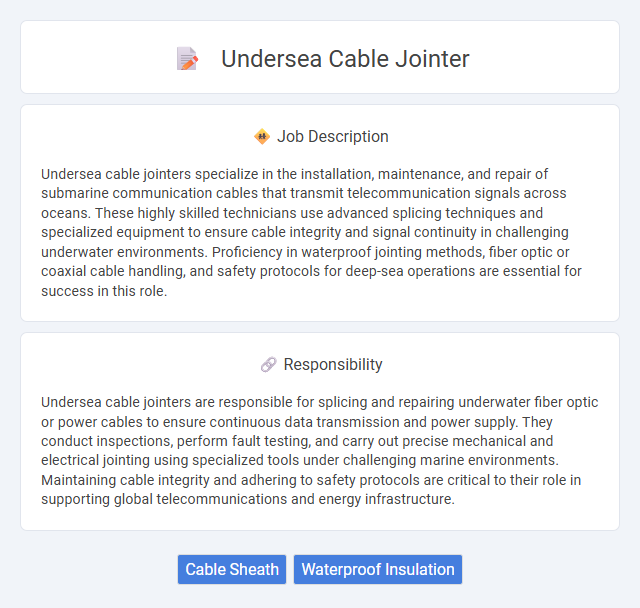
Undersea cable jointers specialize in the installation, maintenance, and repair of submarine communication cables that transmit telecommunication signals across oceans. These highly skilled technicians use advanced splicing techniques and specialized equipment to ensure cable integrity and signal continuity in challenging underwater environments. Proficiency in waterproof jointing methods, fiber optic or coaxial cable handling, and safety protocols for deep-sea operations are essential for success in this role.
Individuals with a strong aptitude for detailed, hands-on technical work and high tolerance for physically demanding and sometimes hazardous environments might be suitable for an undersea cable jointer role. Candidates who can maintain precision under pressure and who are comfortable working in confined, often underwater conditions could find this occupation aligns well with their skills and temperament. Those prone to claustrophobia or who prefer routine, low-risk settings may have a lower probability of thriving in this challenging but specialized field.
Qualification
An undersea cable jointer requires specialized training in fiber optic technology and underwater cable systems, often including certifications in cable splicing and maintenance. Proficiency in handling complex tools and diagnostic equipment, combined with physical fitness and aptitude for working in challenging marine environments, is essential. Candidates typically need experience in electrical engineering or telecommunications, alongside strict adherence to safety protocols and environmental regulations.
Responsibility
Undersea cable jointers are responsible for splicing and repairing underwater fiber optic or power cables to ensure continuous data transmission and power supply. They conduct inspections, perform fault testing, and carry out precise mechanical and electrical jointing using specialized tools under challenging marine environments. Maintaining cable integrity and adhering to safety protocols are critical to their role in supporting global telecommunications and energy infrastructure.
Benefit
Working as an undersea cable jointer likely offers benefits including high earning potential due to the specialized skill set required and opportunities for international travel and work in diverse marine environments. The role probably provides job stability given the ongoing global demand for reliable undersea communication infrastructure. Safety training and access to advanced technology might further enhance the professional development and personal safety of workers in this field.
Challenge
The undersea cable jointer job likely involves significant challenges related to working in harsh underwater environments, where precision and safety are critical. The risk of equipment failure or environmental hazards may require specialized skills and constant vigilance. Navigating complex technical issues during cable splicing under pressure could frequently test problem-solving abilities.
Career Advancement
Undersea cable jointers specialize in connecting and repairing submarine communication cables, a critical role in maintaining global internet and telecommunications infrastructure. Career advancement often involves gaining certifications in fiber optic technology, mastering advanced splicing techniques, and progressing to supervisory or project management positions overseeing large-scale cable installations. Expertise in fault diagnosis and emergency repair operations enhances prospects for higher salaries and leadership roles within cable installation companies or offshore operations.
Key Terms
Cable Sheath
An undersea cable jointer specializes in repairing and splicing the cable sheath to ensure the integrity and protection of underwater communication lines. Mastery of materials such as polyethylene and metal armoring is crucial for effective sealing against water ingress and mechanical damage. Expertise in sheath jointing techniques directly impacts the longevity and performance of subsea fiber optic networks.
Waterproof Insulation
Undersea cable jointers specialize in waterproof insulation techniques to ensure the integrity and durability of subsea power and communication cables. They apply advanced sealing materials and heat-shrinkable sleeves to protect cable joints from water ingress and pressure variations at ocean depths. Expertise in waterproof insulation directly impacts the reliability of undersea networks by preventing short circuits and corrosion.
 kuljobs.com
kuljobs.com